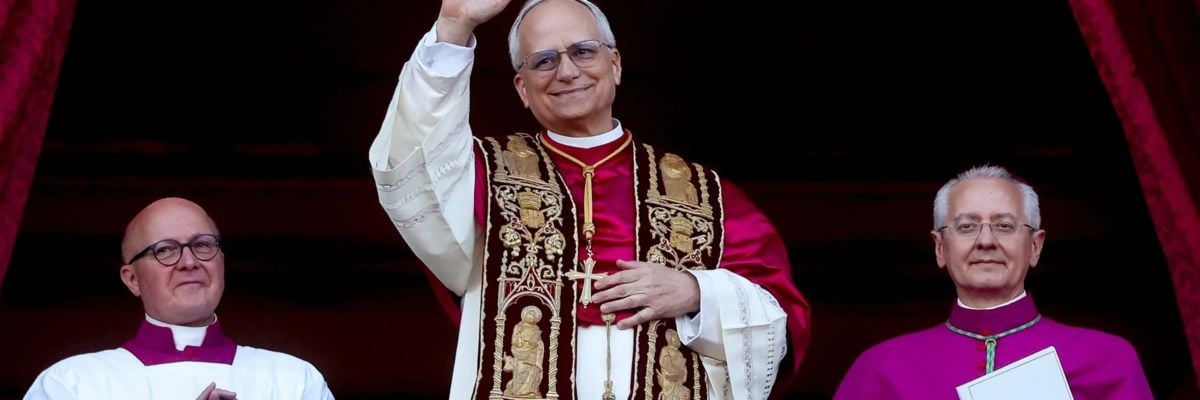
Catholic apologist Joe Heschmeyer joins Thomas Graf to help a caller navigate conversations with members of a sedevacantist traditionalist Catholic group who deny the legitimacy of the current pope.
Transcript:
Caller: My question to you is, I live near a Sedevacantist Traditionalist Catholic Church. That’s what they say on their doors: “Hey, we’re traditional. Come see us.” How do you have an effective dialogue with someone who says there isn’t a pope? Even though I have a picture that has Pope Leo there, they don’t seem to recognize it.
Joe: Oh, wait, sorry. They have a picture of Pope Leo there, but they say he’s not.
Caller: I have a picture of…
Joe: Oh, I see. Okay. I’m sorry.
Caller: I circled it and said, “Hey, here’s the Pope.” But they don’t.
Thomas: Yes, there is. I’ve got him right here. Come on!
Joe: I would start with a couple of things. Number one, Vatican I describes the papacy as a perpetual institution, and it actually has an anathema clause for anyone who would deny this. So if anyone then says it is not from the institution of Christ the Lord himself, or by divine right, that the Blessed Peter has perpetual successors in the primacy over the universal Church, or that the Roman pontiff is not the successor of Blessed Peter in the same primacy, let him be anathema.
So they should at least know that according to Vatican I, which they reject. Excuse me, they accept. They are damned for rejecting the pope and believing that the papacy would just end. Because it’s ultimately a rejection, not of Pope Leo, but a rejection of Christ taking care of his Church. That Christ would, for two generations or more, trick most of the world into believing there was a pope when there wasn’t one, and also that he would just give us no pope.
The longest actual papal interregnum was like two years, two years and a little bit of change. But under three, like, that’s a totally different idea from the idea that you’re just going to have a perpetually vacant see. So that would be one anchor to get in place, because they can’t disagree with that.
So they have to say at some point there will be a pope in the future. Although some people occasionally get around this by saying the world’s about to end and that’s what’s going on. I think this is still a denial of Vatican I. If you take that view, then the world ends without a pope, that looks like the gates of hell have overcome, which Christ promised they wouldn’t in Matthew 16.
Or they’ll say, well, there will be a new pope someday. And here the thing to stress is papal elections are regulated by the law of the Church. So every pope has the ability to lay down instructions for how the next papal election will happen. And sometimes they do slight tweaks; sometimes they do a more substantial overhaul.
Universi Dominici Gregis, John Paul II’s document on this, is the one that’s been in place with slight modifications from both Benedict and Francis. And, you know, maybe Leo will have some modifications in the future. The point there is to have a man chosen as pope, recognized by the pope as pope. It’s not going to be some Gnostic secret knowledge. It’s going to be a public act done legally according to the laws of the Church.
And that was true after the death of every single pope. And so if you believe, “Oh, Pope Pius XII died and then didn’t have a successor,” well, there was a conclave, according to the law of the Church. You’ll find people who claim, “Oh, well, really, they elected some other cardinals secretly.” And there’s literally no evidence for that, just none.
And the alleged cardinal, Cardinal Siri—sorry to any of you who have devices that just turned on—he didn’t claim to be pope. He served the pope. And he didn’t say, “Oh, I’m the actual pope.” And so the fact is, like, we can look and say when these conclaves were and on what day and on what ballot they chose who the next pope would be according to the laws and customs of the Church.
And someone who denies that and just says, “Well, somehow, some way there’s going to be a new pope,” would be like someone saying, “You know, maybe tomorrow there will be a new president.” And you’d say, “Well, the vice president…” They say, “No, no, no, someone totally different, not chosen by the electoral college, not chosen by voting.” And you would reasonably respond to that and say, “I don’t know what you’re talking about. That’s not how presidents are chosen.”
Well, likewise, if your theory of the Church is there’s no pope and no way to get a pope legally that would be recognized, then you believe in a perpetual vacancy, which is explicitly anathematized by the Church since 1870.
So that’s what I would hit. I don’t care if you think the pope is a heretic, because you’re not qualified to make that judgment of the pope. That’s not how you and your relationship to the pope works. So the better question is, are your views contrary to what an ecumenical council taught? And if they are, you should change your views.
Does that make sense?
Caller: Yes. I appreciate that.
Thomas: Great. Thank you so much for that question, Bob. Thanks for calling. And call back in anytime you like.
Let’s move now to Carter listening in Alabama on YouTube.



